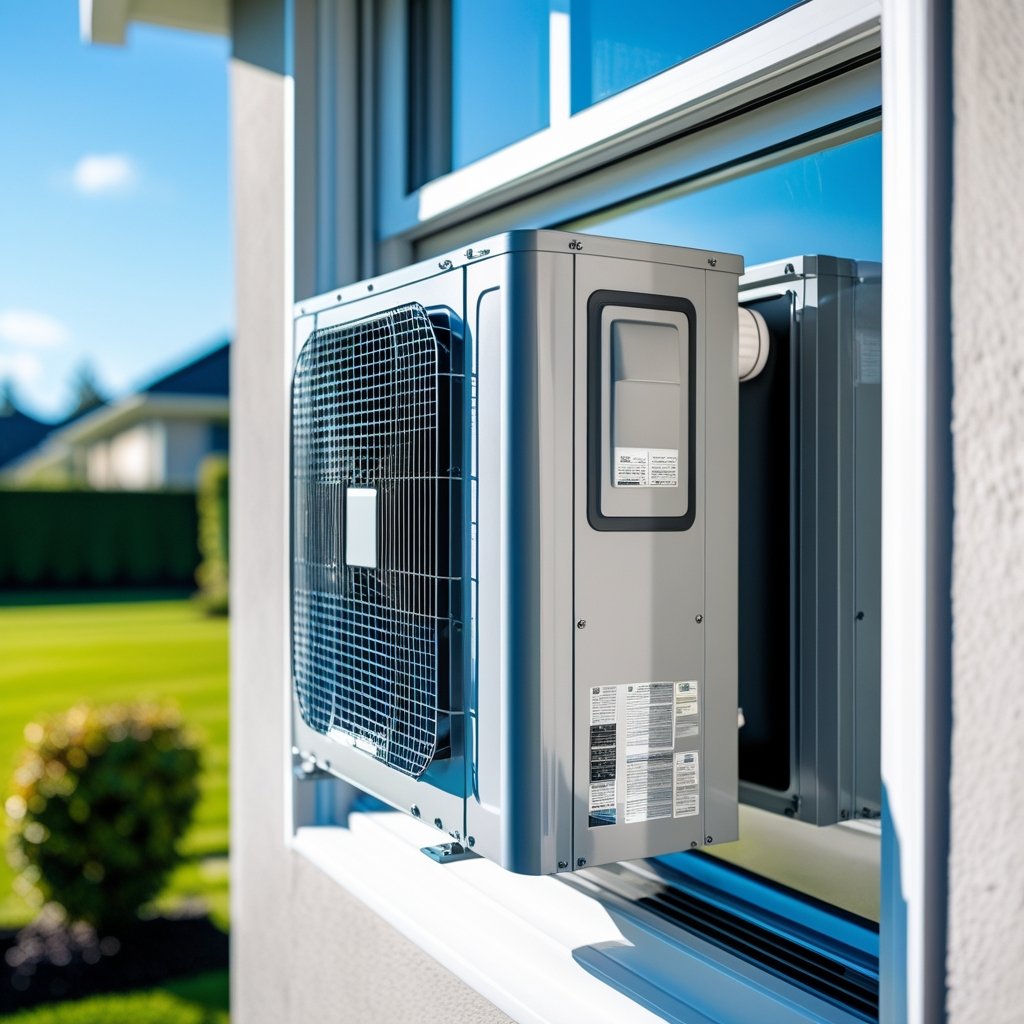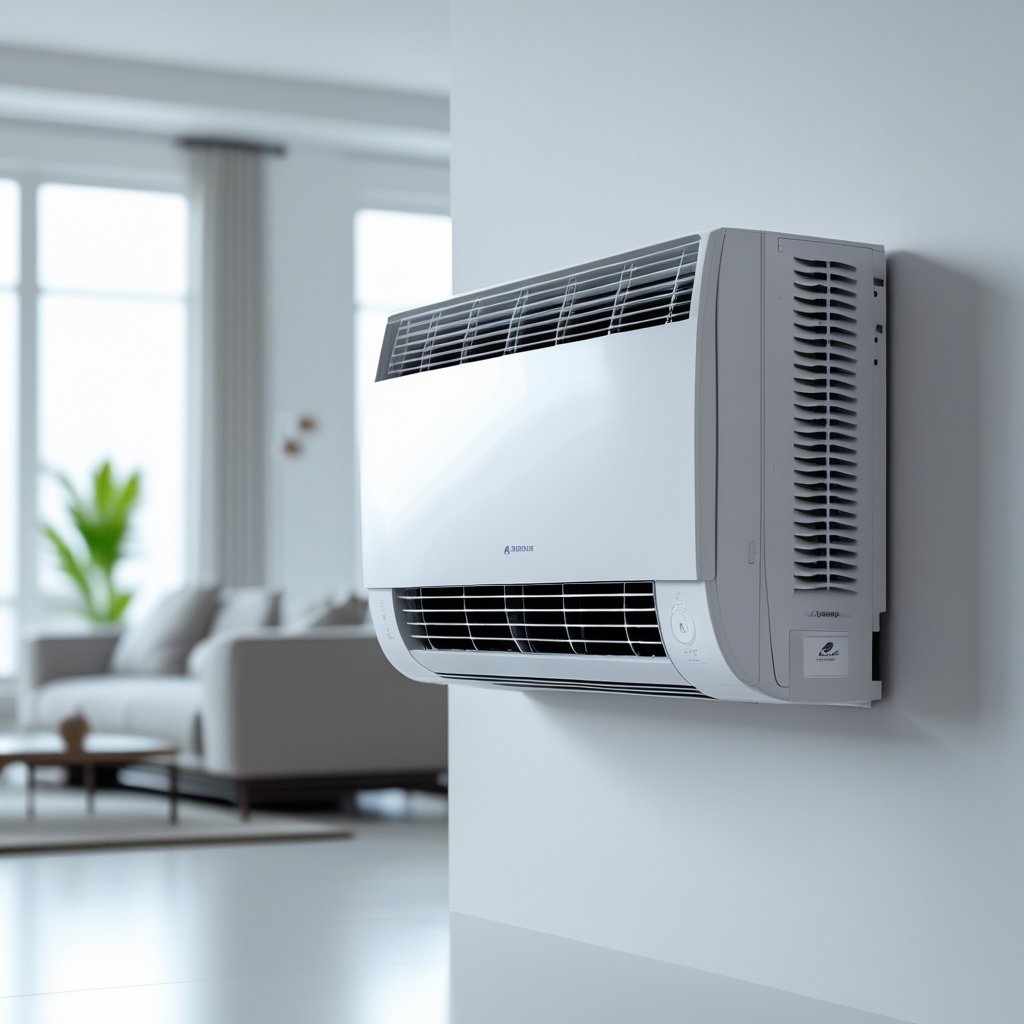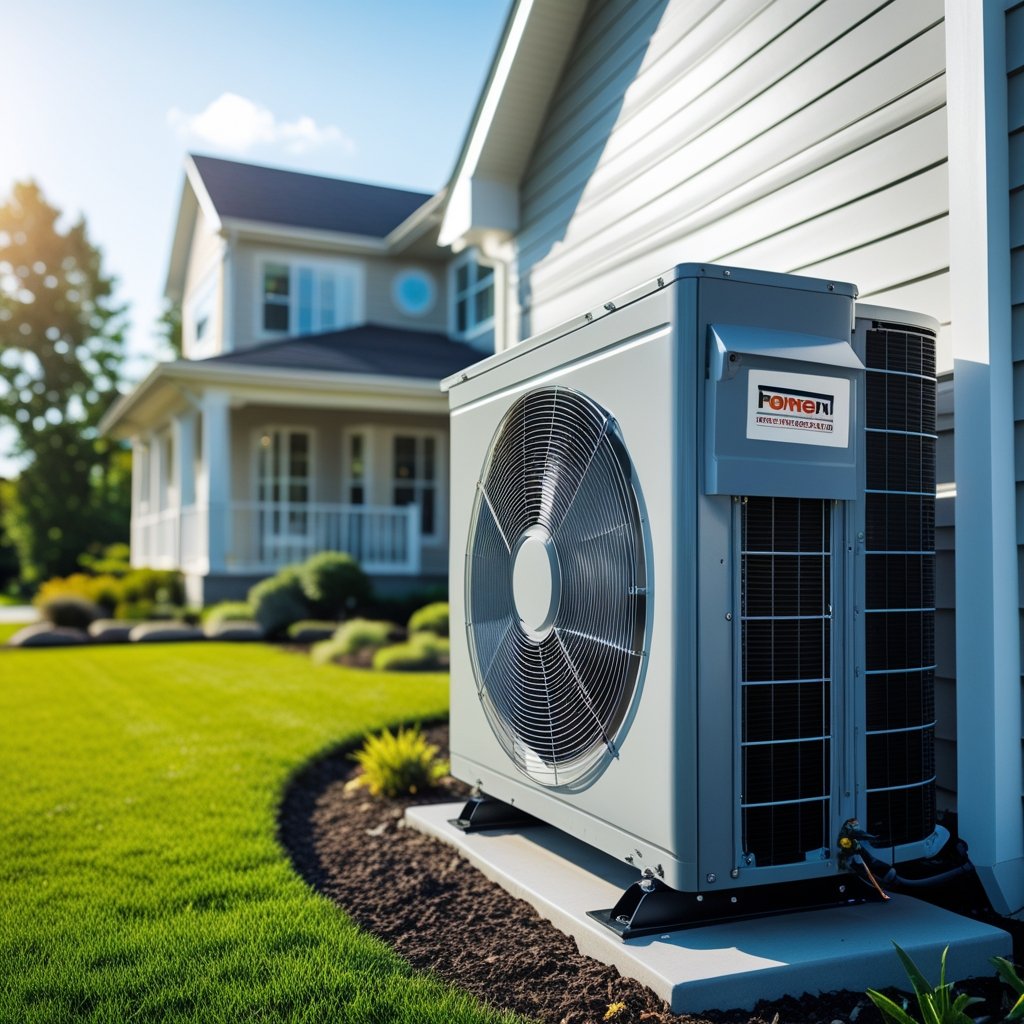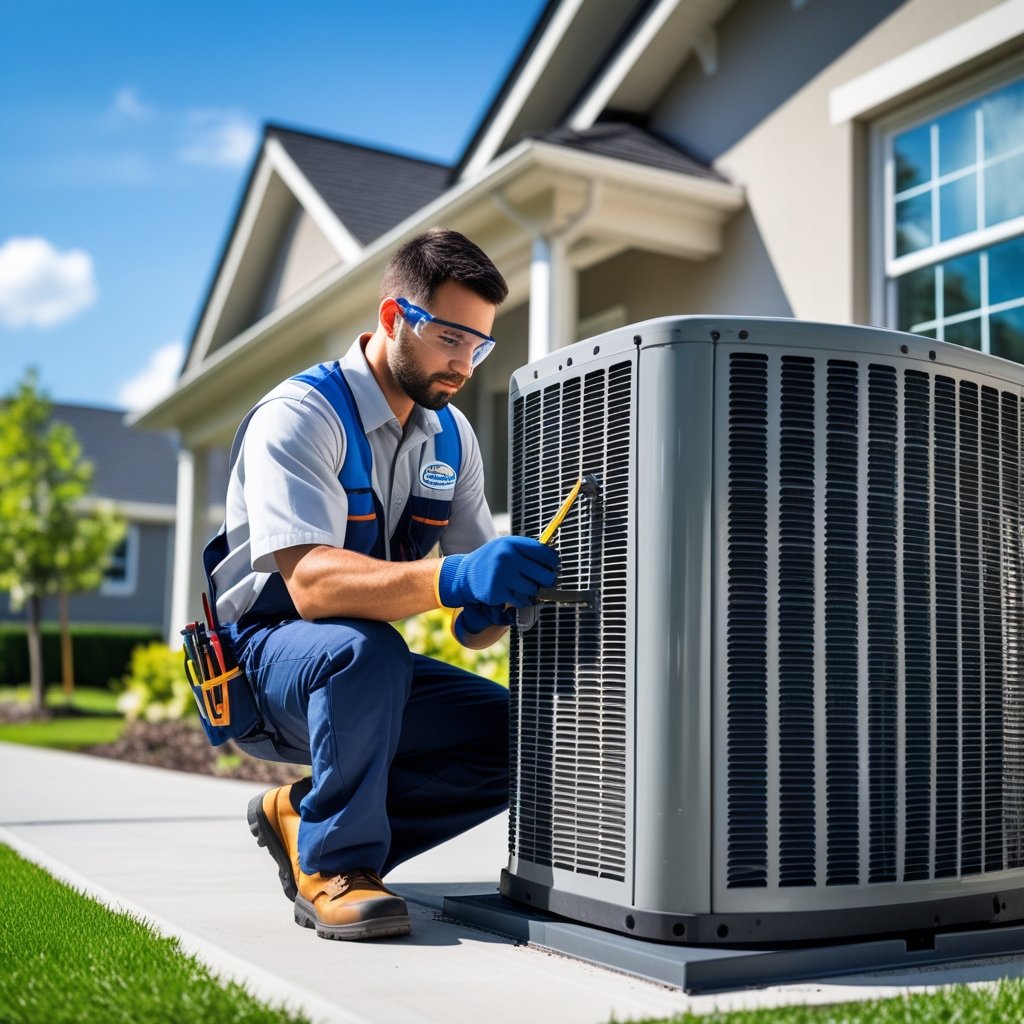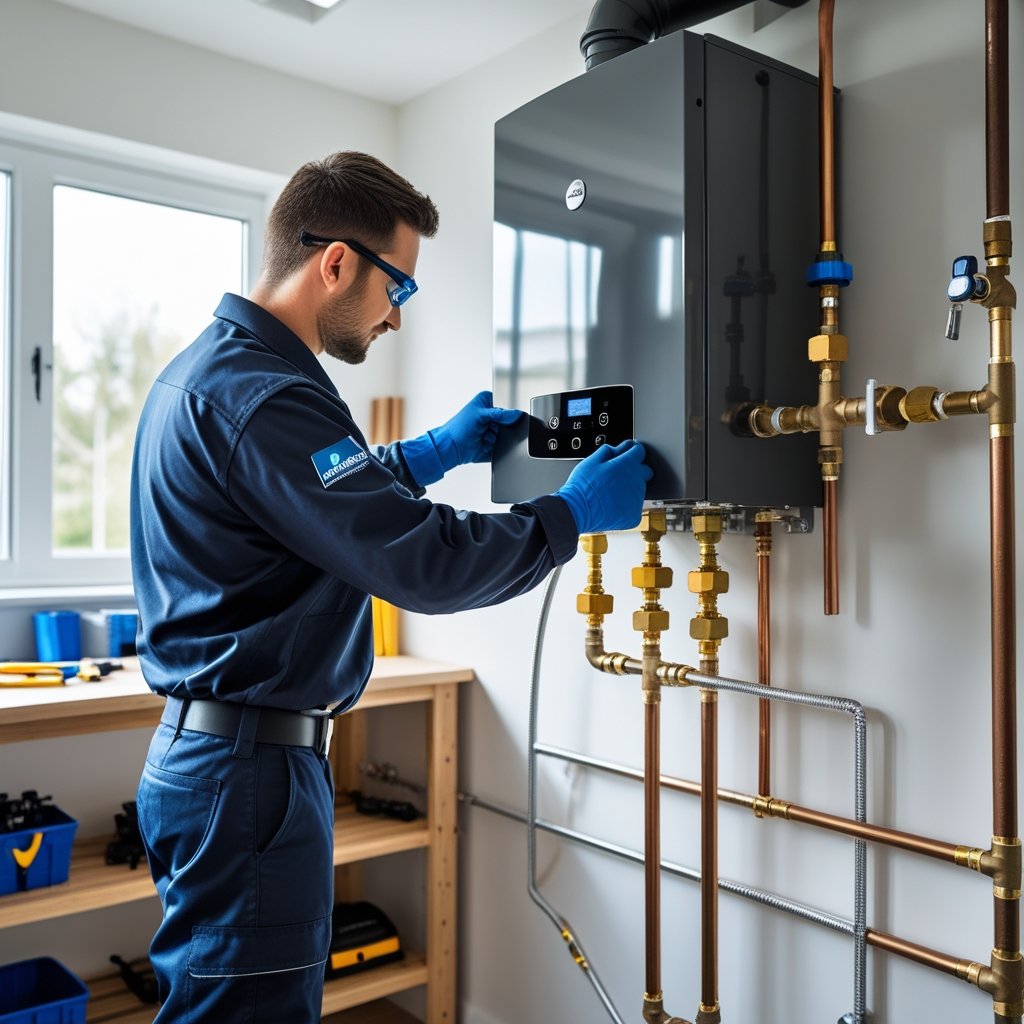Window heat pumps offer an efficient way to heat and cool your home, especially in areas like Elizabethtown, Lancaster County, or York. These systems fit into your window, making installation easier than replacing a full HVAC system.
A window heat pump provides both heating and cooling by moving heat in or out of your home. You can save energy and stay comfortable year-round.
If you want a cost-effective way to upgrade your current system or add comfort to a specific room, window heat pumps are a great choice. They work well in moderate climates like South Central Pennsylvania.
With proper care, window heat pumps can last for many seasons. Learning how to maintain your unit helps protect your investment and keeps it running efficiently.
At Leo Kob Co., we understand the needs of homes in Mount Joy, Hershey, and Lancaster. Our licensed technicians can help you choose, install, and maintain the right solution with honest pricing and quality service.
What Is a Window Heat Pump?
A window heat pump is a heating and cooling system that fits in your window. It moves heat in or out to keep your living space comfortable all year.
You can expect easy installation and energy efficiency. These units let you control temperatures in specific rooms.
How Window Heat Pumps Work
Window heat pumps use refrigerant to transfer heat between inside and outside air. In cooling mode, they pull heat from your room and release it outside.
In heating mode, they draw heat from outside and move it inside, even in cold weather. You’ll find a fan, compressor, and coils inside the unit.
The fan circulates air, and the compressor moves refrigerant through the system. This setup lets the heat pump heat and cool using less electricity than traditional heaters or AC units.
Types of Window Heat Pumps
There are two main types of window heat pumps: single-stage and two-stage. Single-stage models run at full power only and are usually more affordable.
Two-stage units adjust their power based on your needs, offering better efficiency and temperature control. Some window heat pumps include smart controls or remote operation.
You can set and monitor temperatures from your phone. These features improve comfort and help save energy in your home.
Key Features of Window Heat Pumps
Window heat pumps offer:
- Energy efficiency: Advanced technology reduces electricity use.
- Zone control: Heat or cool only where you need it.
- Easy installation: Fits standard windows with no major changes.
- Quiet operation: Modern models run quietly.
- Maintenance needs: Regular filter cleaning keeps them working well.
If you live in Mount Joy or York, window heat pumps provide a cost-effective way to manage your home’s temperature.
Benefits of Window Heat Pumps
Window heat pumps can cut energy costs and keep your home comfortable all year. They are easy to install and work well for many homes in South Central Pennsylvania.
Energy Efficiency Advantages
Window heat pumps use less energy because they heat or cool only the room where you install them. This prevents wasting power on unused spaces.
You can lower your energy bills, especially in places like Elizabethtown and Lancaster County with changing seasons. Window heat pumps don’t need ducts, so you avoid energy loss through leaks.
Many models offer smart controls. You can set temperatures for different times of day to save even more energy.
If you want to reduce your carbon footprint and keep your home comfortable, a window heat pump is a solid choice.
Year-Round Comfort
Window heat pumps provide both heating and cooling, so you can use them in every season. You won’t need to switch between devices or worry about high utility bills from old systems.
They control temperatures in specific rooms, giving you comfort where you need it most. No more cold spots or overheated rooms you rarely use.
They run quietly, keeping your home peaceful. These systems also keep air moving and fresh, which is better for indoor air quality since they don’t use ductwork that can trap dust and allergens.
Cost Savings
Window heat pumps often cost less to buy and install than full HVAC systems. You save money upfront because you don’t need big ductwork projects.
Over time, energy savings add up. They are easier and cheaper to maintain than traditional systems, reducing repair costs.
Many models qualify for federal tax credits and local rebates, lowering your investment even more.
Selecting the Right Window Heat Pump
When choosing a window heat pump, consider the right size for your room, how efficient the unit is, and how much noise it makes. These details help your system work well without wasting energy or disturbing your home.
Sizing and Capacity Considerations
Pick the right size heat pump for the space you want to heat or cool. If it’s too small, it won’t keep your room comfortable.
If it’s too big, it will waste energy and raise your bills. Estimate size by square footage.
For example:
- Up to 300 sq. ft. needs about 5,000 BTUs
- 300 to 500 sq. ft. needs around 8,000 BTUs
- Larger spaces need 10,000 BTUs or more
Consider insulation and window size in your home. A local expert can help you find the best fit.
Efficiency Ratings Explained
Efficiency ratings show how well a heat pump uses electricity. Look for the Energy Efficiency Ratio (EER) or Seasonal Energy Efficiency Ratio (SEER).
Higher EER or SEER means the unit uses less energy. Most window heat pumps have EER ratings between 10 and 12.
Models with ENERGY STAR certification can save you money over time. Choosing an efficient heat pump works well with energy-saving programs and rebates in South Central Pennsylvania.
Noise Levels and Aesthetics
Window heat pumps vary in noise. Look for models with noise levels under 55 dB for bedrooms or living rooms.
Placement affects noise. Install the unit away from bedroom windows if possible.
Appearance matters since you’ll see the unit inside and outside your home. Many models have sleek designs with neutral colors that blend with home exteriors.
Choose a unit that fits your home’s look and keeps your space peaceful.
Installation and Placement Tips
Plan carefully before installing a window heat pump. Choose the right spot and prepare to avoid common mistakes.
Preparation Steps
Before installation, check your window size to ensure the heat pump fits. Measure width and height carefully.
Clear the area around the window inside and outside. Make sure the window can support the unit’s weight.
Reinforce the window frame if needed. Use a level to keep the unit straight during installation.
Gather all tools and parts in advance. You may need screws, brackets, weatherstripping, and foam sealant.
Turn off the circuit breaker connected to the outlet for safety.
Best Locations for Installation
Choose a window that doesn’t get direct sunlight. Too much sun can reduce cooling efficiency.
North- or east-facing windows work best in South Central Pennsylvania. Make sure the heat pump can vent outside without obstacles.
Keep it away from shrubs or plants that block airflow. Place it close to an electrical outlet for easy connection.
Install the unit at a height that lets cool air circulate well. Avoid windows near heat sources like stoves or heaters.
Common Installation Mistakes to Avoid
Don’t install the heat pump in a window that isn’t level. A tilted unit can cause leaks and reduce performance.
Seal all gaps around the unit. Unsealed gaps let air leak and raise energy costs.
Support the window frame properly. Overloading it without support can damage your window.
Plug the heat pump into a dedicated outlet with the correct voltage and circuit breaker. Avoid using extension cords.
Call us for help with mini-split or window heat pump installation in Elizabethtown, Lancaster, York, or nearby. Leo Kob Co. offers quality service at a fair price.
Maintenance and Care
Keep your window heat pump in good shape to help it run efficiently and save money on energy bills. Regular upkeep prevents repairs and keeps your home comfortable.
Regular Cleaning Guidelines
Clean your window heat pump every month during use. Turn off the power before cleaning.
What to clean:
- Filter: Remove and rinse with warm water. Let it dry before replacing.
- Coils: Gently brush dust and debris from indoor and outdoor coils.
- Exterior: Wipe the outer casing with a damp cloth.
Check for visible damage or leaks while cleaning. Clean parts improve air quality and system life.
Seasonal Maintenance Tasks
Before winter and summer, inspect your heat pump to prepare for temperature changes.
- Inspect seals: Look for gaps or cracks around the window frame. Replace worn weather stripping.
- Clear debris: Remove leaves, dirt, or snow from the outdoor unit.
- Test function: Run the system in heating and cooling modes. Listen for unusual noises.
- Professional check: Schedule service with licensed technicians in your area.
These simple steps each season keep your heat pump reliable.
Common Applications for Window Heat Pumps
Window heat pumps help you heat and cool specific rooms without large installation work. They are easy to install and save energy where central systems may not be ideal.
Residential Uses
Use window heat pumps to add comfort to rooms that don’t get good airflow from your main system. They work well for bedrooms, basements, or sunrooms that need extra heating or cooling.
These units fit into a window or wall opening, so you avoid major remodeling. You get both heating and cooling with one device.
They use less energy than older window AC units, which can lower your bills. If you have a home in Elizabethtown or Mount Joy, a window heat pump can keep small spaces cozy without raising energy costs.
They work quietly and can serve as a backup during extreme weather.
Office and Commercial Spaces
In offices or small commercial buildings, window heat pumps offer flexible temperature control without changing your entire HVAC system. Many shops or offices use them to keep staff comfortable in specific rooms.
You can install them quickly without major renovations. They heat and cool areas like conference rooms, small retail spaces, or break rooms.
Window heat pumps help in buildings without ductwork. They maintain steady temperatures in places central systems may not reach, offering better comfort without high energy use.
Comparing Window Heat Pumps to Other Systems
When you choose a heating and cooling option, it helps to know how window heat pumps compare to other popular choices. This gives you a clearer idea of what fits your home and comfort needs best.
Window Heat Pumps vs. Portable Units
Window heat pumps fit directly in your window frame and provide both heating and cooling. They are more efficient than most portable units because they use heat pump technology, which moves heat instead of creating it.
This saves energy and lowers your utility bills. Portable units are easy to move but usually less efficient.
They take up floor space and can be louder. Portable units often only cool the room they’re in, while window heat pumps can condition larger areas.
Window Heat Pumps vs. Ductless Mini-Splits
Both window heat pumps and ductless mini-splits use advanced heat pump technology to control indoor temperatures efficiently. Mini-splits have separate indoor units placed on walls, connected to an outdoor compressor, and work without ductwork.
Mini-splits tend to be more efficient than window heat pumps because they deliver conditioned air directly, with less loss. They also offer more cooling and heating power and can serve multiple rooms.
Mini-splits require professional installation and a higher upfront cost. Window heat pumps are easier to install as a DIY or simple project, making them good for renters or smaller spaces.
If you want easy setup and moderate comfort for a single room, go with a window heat pump.
Troubleshooting and Common Issues
When your window heat pump isn’t working right, check a few key things. Some problems are easy to fix, while others need a professional.
Knowing what to look for can save time and keep your home comfortable.
Performance Problems
If your window heat pump isn’t heating or cooling evenly, check the air filter. A dirty or clogged filter can block airflow and reduce performance.
Replace the filter if it looks dirty. Look for any objects blocking the air vents or outdoor unit.
Clear away anything blocking airflow. Unusual sounds like buzzing, clicking, or rattling often mean something is loose or the unit needs cleaning.
If the unit won’t turn on or cool properly, check the thermostat settings or look for low refrigerant levels. Make sure the power supply is steady and the circuit breaker hasn’t tripped.
If you notice weak airflow or uneven room temperatures, the system needs a checkup.
When to Call a Professional
If tightening loose parts, changing filters, or adjusting settings doesn’t fix the problem, call a technician. Problems like refrigerant leaks, faulty wiring, or compressor issues need special tools and experience.
In South Central Pennsylvania towns like Elizabethtown or Lancaster, local HVAC pros can repair these complex issues and keep your unit running efficiently.
Call for help if the unit makes loud noises regularly, stops working entirely, or trips your circuit breaker often. A trained technician can perform a full inspection and fix hidden problems before they get worse.
Scheduling regular maintenance with a trusted company helps avoid many issues and keeps your system reliable through all seasons.
Sustainability and Environmental Impact
Window heat pumps use less electricity than many traditional systems. They move heat instead of creating it, which saves energy and lowers bills.
Eco-Friendly Features
Your window heat pump uses refrigerants that are safer for the environment than older systems. These newer refrigerants reduce damage to the ozone layer.
The system's energy-efficient design means it uses less power to heat or cool your home. Because it doesn’t burn fuel, a window heat pump produces fewer emissions.
This makes it a better option if you want to reduce pollution around Elizabethtown, Lancaster County, or York.
Reducing Carbon Footprint
When you use a window heat pump, you cut down on how much energy your home needs. This means fewer fossil fuels are burned to generate electricity in your area.
Over time, this lowers your home's carbon footprint. Proper maintenance is important too.
Keeping your heat pump tuned saves energy and helps avoid unnecessary repairs, which also reduces waste. If you live in Mount Joy or Hershey, you can ask local experts for seasonal check-ups to keep your system running efficiently.
Frequently Asked Questions
Window heat pumps come in different models with various features to fit your home. Installing them usually involves placing the unit in a window and securing it properly.
Energy ratings tell you how much you can save. Many models also cool the air like an air conditioner.
Maintenance keeps the system working well. Voltage options affect performance and installation needs.
What are the best window heat pumps available on the market?
The best window heat pumps offer strong heating and cooling, quiet operation, and good energy efficiency. Brands with good reviews and warranty coverage tend to perform well in homes around Lancaster County and York.
Look for models with Energy Star ratings and features like remote control or smart home compatibility.
How do you install a window heat pump in your home?
Installation usually means placing the unit in a double-hung window or a sliding window. You’ll need to secure it with brackets and sealing foam to stop drafts.
Sometimes, you may want a professional to help, especially if you’re in Elizabethtown or Hershey, to make sure it fits and works safely.
What are the energy efficiency ratings for popular window heat pumps?
Energy efficiency is measured by the Seasonal Energy Efficiency Ratio (SEER) and Heating Seasonal Performance Factor (HSPF). Good window heat pumps typically have SEER ratings over 14 and HSPF around 9.
Higher ratings mean lower energy bills and less wear.
Can a window heat pump also function as an air conditioner?
Yes, most window heat pumps can both heat your home and cool it during warmer months. This makes them a flexible option for year-round comfort.
What maintenance is required for a window heat pump to ensure optimal performance?
You should clean or replace filters regularly, at least every 1-3 months. Check the outdoor coils for dirt or debris and clear any blockages.
Inspect seals around the unit each season to prevent air leaks. Annual checkups by a local HVAC expert in Mount Joy or Lancaster keep things running smoothly.
Are there any notable differences between 220v and 115v window heat pumps?
220v units often provide more power. They can heat or cool larger spaces better.
You usually need a dedicated circuit for a 220v unit, so installation might be more complex. 115v models are easier to plug into standard outlets.
However, 115v models may not work as well in bigger rooms. Your choice depends on your home’s wiring and heating needs in South Central Pennsylvania.

